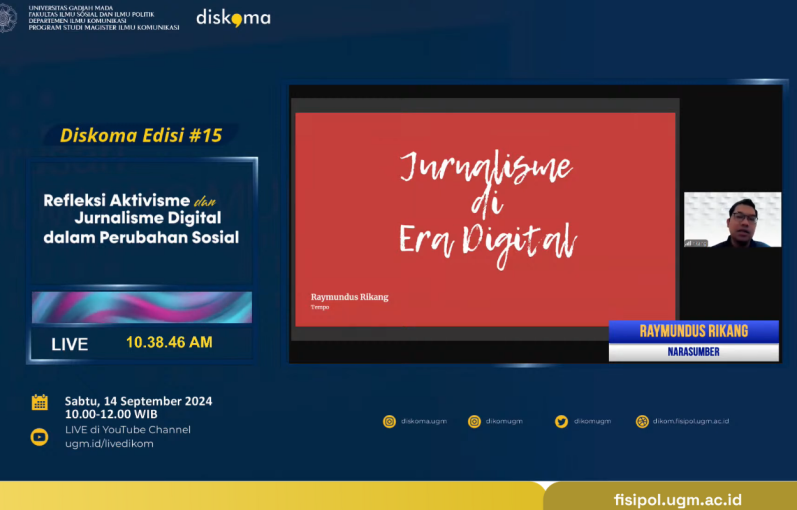
Yogyakarta, 14th of September 2024—The #KawalPutusanMK movement, which was spread massively through social media, became a form of digital activism that can have the potential to influence and push social transformation in our society. Digital phenomenons like the ones that we can observe for the past few weeks show the collaborative power, from both activists and journalists, in their efforts on safeguarding the principles of democracy.
In order to safeguard activism even further, the Magistrate Department of Communications Science of Fisipol UGM organized a discussion and invited Firda Ainun, as an expert on the issue of gender and democracy, as well as Raymundus Rikang, as a journalist practitioner from Tempo.
The use of social media is seen as a strong platform for advocating public aspirations. Firda Ainun opened the discussion by highlighting the fact that the base of activism came from the presence of morally grounded interests. This social transformation movement is done to take advantage of social media, in order to rally the masses in a short time.
“Back then, rallying a large number of people took days. Now, through posters and social media posts, it will only take activists a few minutes to gather millions of views and shares from people all over. Due to that, it is easier to mobilize political transformations,” added Firdaun in her previous explanation.
The dynamics of the massive flow of information has enormous potential as a tool of social control in creating an inclusive digital movement. Through the digital world, activists can use tactics and ways in grabbing the attention of the masses so that they can be more effective when they spread their message and campaigns.
Raymundus Rikang also richened the discussion session by emphasizing the importance of the roles of journalists in safeguarding digital activism. According to Raymundus, there are many digital phenomena done by many activists, such as opening up government scandals, that are in line with the practices of journalism.
Although, when faced with the SOPs of journalism, like the code of ethics, much of that information is released directly as public consumption. This can also cause a challenge in the distribution of information. Because of that, information and data gathered from the activities of digital activism can be a base for journalists in uncovering government scandals.
“There is a high likelihood of chances that both the sector of journalism and activism may collaborate with each other without sacrificing their own code of ethics. Such as in the aspects of mobilization of influence, information that is spread in social media can be spread easier through the use of official media organizations. Therefore, the job of a journalist is to filter that information so that it is in line with the ethical code,” explained Rikang.
This collaboration strengthened the movement by legitimizing information spreaded by activists. The partnership, done by civil society organizations, pushes inclusivity because the filtered and accurate information can be distributed equally. With that, this collaboration did not just widen the reach, but also increased the quality of public discourses, making it more inclusive and long-lasting.
